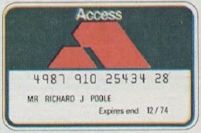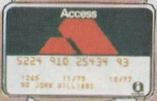The Access Credit Card: History 1973 - 1977
Difficult Times
In 1973, a monetary policy known as "Competition and Credit Control", which had begun in 1971 and was intended to increase competition amongst financial organisations (by allowing then to define their own interest rates) came to an end. Along with this, new government legislation raised minimum repayments from the greater of £2 or 5% of the outstanding balance to the greater of £6 or 15% of the outstanding balance[1]. Suddenly, the economic outlook for Access (and Barclaycard) had become somewhat more difficult.
Expansion & Change
Also in 1973, JCCC bought a 15% share in Eurocard, and in the following year, joined "Master Charge" (now MasterCard), which resulted in them being able to use the extensive payment network that company had already built up[2].
Soon after joining Master Charge, Access cards now took on the Bank Identification Number (BIN) prefix that would remain with these cards for many years, as they moved from the original 4987 prefix to the 5224 prefix. From the mid-70s, the '4' prefix came to represent Visa cards, whilst the '5' prefix represented Master Charge. It was clear, therefore, that Access had to shift away from the '4987' prefix anyway.


Your Flexible Friend
From 1972 until 1977, advertising for Access was common in the paper media; many adverts could be found in the TV Times and Radio Times. Examples of these are in the 'Paper Ads' section. 1977 saw a slow down in the turnover of different adverts, and with hindsight, the likely cause was the build-up to the hugely successful "Access - Your Flexible Friend" advertising campaign.
2 - Jarunee Wonglimpiyarat, Strategies Of Competition In The Bank Card Business
Copyright 2026 - www.accesscreditcard.info :: The Access credit card brand and various related imagery are trademarks of MasterCard International Incorporated.
Access credit card ~ Visa ~ MasterCard ~ Barclaycard
Website by Ontime Development.